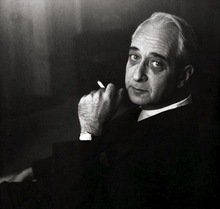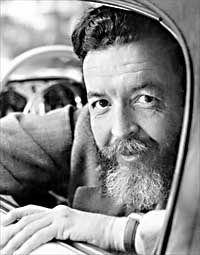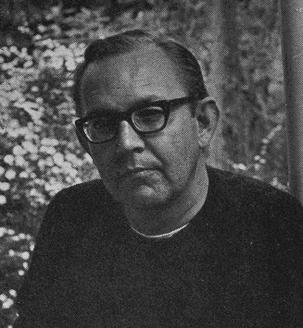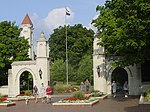
Matthew Arnold was an English poet and cultural critic. He was the son of Thomas Arnold, the headmaster of Rugby School, and brother to both Tom Arnold, literary professor, and William Delafield Arnold, novelist and colonial administrator. He has been characterised as a sage writer, a type of writer who chastises and instructs the reader on contemporary social issues. He was also an inspector of schools for thirty-five years, and supported the concept of state-regulated secondary education.

John Crowe Ransom was an American educator, scholar, literary critic, poet, essayist and editor. He is considered to be a founder of the New Criticism school of literary criticism. As a faculty member at Kenyon College, he was the first editor of the widely regarded Kenyon Review. Highly respected as a teacher and mentor to a generation of accomplished students, he also was a prize-winning poet and essayist. He was nominated for the 1973 Nobel Prize in Literature.
William Hugh Kenner was a Canadian literary scholar, critic and professor. His studies on Modernist literature often analyzed the work of James Joyce, Ezra Pound, and Samuel Beckett. His major study of the period, The Pound Era, argued for Pound as the central figure of Modernism, and is considered one of the most important works on the topic.

Lionel Mordecai Trilling was an American literary critic, short story writer, essayist, and teacher. He was one of the leading U.S. critics of the 20th century who analyzed the contemporary cultural, social, and political implications of literature. With his wife Diana Trilling, whom he married in 1929, he was a member of the New York Intellectuals and contributor to the Partisan Review.
New Criticism was a formalist movement in literary theory that dominated American literary criticism in the middle decades of the 20th century. It emphasized close reading, particularly of poetry, to discover how a work of literature functioned as a self-contained, self-referential aesthetic object. The movement derived its name from John Crowe Ransom's 1941 book The New Criticism.

Cleanth Brooks was an American literary critic and professor. He is best known for his contributions to New Criticism in the mid-20th century and for revolutionizing the teaching of poetry in American higher education. His best-known works, The Well Wrought Urn: Studies in the Structure of Poetry (1947) and Modern Poetry and the Tradition (1939), argue for the centrality of ambiguity and paradox as a way of understanding poetry. With his writing, Brooks helped to formulate formalist criticism, emphasizing "the interior life of a poem" and codifying the principles of close reading.

Mark Van Doren was an American poet, writer and critic. He was a scholar and a professor of English at Columbia University for nearly 40 years, where he inspired a generation of influential writers and thinkers including Thomas Merton, Robert Lax, John Berryman, Whittaker Chambers, and Beat Generation writers such as Allen Ginsberg and Jack Kerouac. He was literary editor of The Nation, in New York City (1924–1928), and its film critic, 1935 to 1938.

Randall Jarrelljə-REL was an American poet, literary critic, children's author, essayist, and novelist. He was the 11th Consultant in Poetry to the Library of Congress—a position that now bears the title Poet Laureate of the United States.

Anthony Evan Hecht was an American poet. His work combined a deep interest in form with a passionate desire to confront the horrors of 20th century history, with the Second World War, in which he fought, and the Holocaust being recurrent themes in his work.

The Kenyon Review is a literary magazine based in Gambier, Ohio, home of Kenyon College. The Review was founded in 1939 by John Crowe Ransom, critic and professor of English at Kenyon College, who served as its editor until 1959. The Review has published early works by generations of important writers, including Robert Penn Warren, Ford Madox Ford, Robert Lowell, Delmore Schwartz, Flannery O'Connor, and others.

Alan Douglas Edward Cameron, was a British classicist and academic. He was Charles Anthon Professor Emeritus of the Latin Language and Literature at Columbia University, New York. He was one of the leading scholars of the literature and history of the later Roman world and at the same time a wide-ranging classical philologist whose work encompassed above all the Greek and Latin poetic tradition from Hellenistic to Byzantine times but also aspects of late antique art.
Austin Warren was an American literary critic, author, and professor of English.
Gordon Keith Chalmers was a scholar of seventeenth-century English thought and letters, president of Rockford College and Kenyon College, and a national leader in American higher education.

Robie Mayhew Macauley was an American editor, novelist and critic whose literary career spanned more than 50 years.
Steven Paul Marcus was an American academic and literary critic who published influential psychoanalytic analyses of the novels of Charles Dickens and Victorian pornography. He was George Delacorte Professor Emeritus in the Humanities at Columbia University.

Eugene "Gene" Paul Nassar, was a writer, editor, professor, and literary critic. He was a professor emeritus of english at Utica College, Utica, New York.
Albert Spaulding Cook was a noted American literary critic, poet, classical scholar, teacher and translator. He taught Classics, English and Comparative Literature at the University of California, Berkeley, Western Reserve, the University at Buffalo and Brown University, as well as at various universities abroad.

George William Lanning Jr. was an American editor, novelist and critic whose literary career spanned the 1950s through the 1980s.

Anna Granville Hatcher (1905–1978) was an American linguist. She started her career as a Romance linguist, and later conducted research in medieval literature as well as branching out from Late Latin and Old French to studies on Provençal, Spanish, Italian, English, and German. She was the first woman to hold the position of full professor at Johns Hopkins University.
John Anderson Thompson, Jr. was an American professor, poet, literary critic and writer whose literary career spanned sixty years, from 1938 to 1998.














